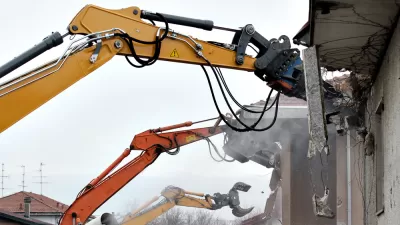One brazen entrepreneur from Detroit is looking to raise funds to bring his "zombie theme park" concept to life, Sarah Cox reports.
Like so many others in Detroit, Marc Siwak is troubled by the state his hometown is in. Residential occupancy has slumped below 40% in vast swaths of the city, and many abandoned houses have decayed beyond repair. Not one to take such indignation lying down, Siwak has launched a plan to make the highest and best use of these blighted spaces: convert them into a sprawling, post-apocalyptic zombie theme park.
Z World Detroit, as Siwak calls it, will offer tourists and locals alike the experience of being "chased down by Zombies, chased through the streets; you'll be running for your life hiding out in buildings, looking for supplies and trying to establish a base."
Cox quips, "Now even visitors from the 'burbs can 'wonder if they will make it through the night.' And new Detroiters that missed 'rock bottom' can pay to have a more terrifying version of the city re-created. (No word on those admission fees yet but someone had better make sure they know to include a Coney Dog stand)."
There's just one catch: Siwak needs $145,000 to move his plans forward. Judging by the strength of the proposal's conceptual mock-ups, though, we might be better off just waiting for an actual zombie apocalypse instead.
FULL STORY: Zombie Apocalypse Theme Park Will Fix Neighborhood Blight

Planetizen Federal Action Tracker
A weekly monitor of how Trump’s orders and actions are impacting planners and planning in America.

Restaurant Patios Were a Pandemic Win — Why Were They so Hard to Keep?
Social distancing requirements and changes in travel patterns prompted cities to pilot new uses for street and sidewalk space. Then it got complicated.

Maui's Vacation Rental Debate Turns Ugly
Verbal attacks, misinformation campaigns and fistfights plague a high-stakes debate to convert thousands of vacation rentals into long-term housing.

In California Battle of Housing vs. Environment, Housing Just Won
A new state law significantly limits the power of CEQA, an environmental review law that served as a powerful tool for blocking new development.

Boulder Eliminates Parking Minimums Citywide
Officials estimate the cost of building a single underground parking space at up to $100,000.

Orange County, Florida Adopts Largest US “Sprawl Repair” Code
The ‘Orange Code’ seeks to rectify decades of sprawl-inducing, car-oriented development.
Urban Design for Planners 1: Software Tools
This six-course series explores essential urban design concepts using open source software and equips planners with the tools they need to participate fully in the urban design process.
Planning for Universal Design
Learn the tools for implementing Universal Design in planning regulations.
Heyer Gruel & Associates PA
JM Goldson LLC
Custer County Colorado
City of Camden Redevelopment Agency
City of Astoria
Transportation Research & Education Center (TREC) at Portland State University
Jefferson Parish Government
Camden Redevelopment Agency
City of Claremont





























